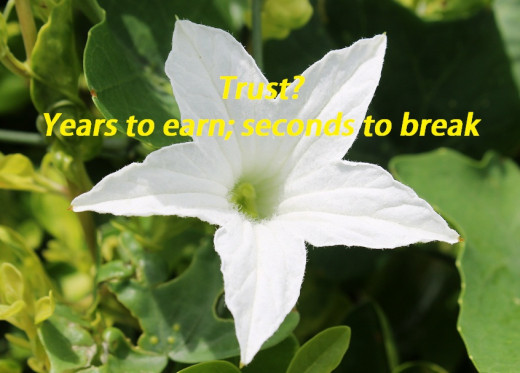How to Build Trust in a Relationship
Trust in a Relationship
Trust is central to any relationship, be it romantic or marital, parental, work relationship or social relationship. Relationships are built one step at a time. Small deposits of trust which are reciprocated, help build mutual acceptance and understanding. Trust in relationships strengthens lines of communication, taking the relationship into a higher level. Trust in relationships helps discover shared ideals and values and to explore shared goals that keep people together in their pursuits. A lasting and healthy relationship is cemented by trust between partners. Trust is the glue that holds any relationship together. Sometimes when there is a breakdown in trust, people tend to lose their trust not just in that person, but also in such relationships in general, and may become skeptical and fearful of such relationships in future.

Meaning and Definition of Trust
Meaning
Online Dictionary : Firm belief in the reliability, truth, ability, or strength of someone or something.
Merriam-Webster’s online: a) assured reliance on the character, ability, strength, or truth of someone or something. b) dependence on something future or contingent : Hope
Definition of Trust
A definition by Rempel, Holmes and Zanna (1985): Trust requires that partners be seen as reliable and predictable, that the partner is concerned with one’s needs, and that the individual feels a sense of confidence in the relationship with the partner.
Trust Relationships
Trusting someone is a huge emotional investment, with an enormous risk. The premise we make while trusting someone is that the other person is an honest individual and would treat us with respect and dignity. That he/she is predictable in their behaviour towards your basic beliefs and values. He/she is benevolent or caring by nature and would be supportive of you, and that this person has your best interest at heart. He/she will not exploit or misuse the trust - good faith. With our knowledge and experience we could at best infer or attribute certain qualities to people. Sometimes it may only be possible to know a person’s trustworthiness by investing some trust in them.
Deciding who deserves our trust and how much we want to become involved or emotionally invest in a person, is a matter of personal choice. The rewards and the risk are all there. However in a intimate relationship, trusting each other makes the relationship a safe emotional haven for partners to be truthful and authentic in what they say and do. Research shows that people in romantic relationships tend to lie one out three times, while people in long term/marital relationships lie only one out of ten times. The trust that has been established between partners helps them to understand and accept what is being said positively, reducing the need for lies.

Trust In Relationship
To trust another, it is important to know yourself and your expectations of the other. Knowing yourself buffers you against the backlash of rejection, and the eroding of self-worth that it could cause if you are unsure of who you are.
However, as social beings we find our completeness in being able to relate to others. We desire to be trusted, respected and accepted for who we are, as much as we would like to love, nurture and cherish someone in our lives. This is an inevitable risk which one may be required to take at the peril of rejection and shame to have our basic desires fulfilled.
Trust in a relationship allows for personal space between the partners. There is a healthy mutual dependency. Trust makes it easy to allow your partner to function in his/her life outside of the relationship, normally. Though you maintain a great deal of connectedness, there is also a healthy distance between the partners that allows for growth as an individual.
This makes the relationship meaningful and intimate. Lack of trust leads to possessiveness, jealousy, disrespect of personal space which could drain the trust or the lifeblood from the relationship.
The four aspects of trust in relationship
1) reliability /integrity
2) predictability/consistency
3) the ability or capacity to care, share and nurture
4) be altruistic
Trust helps partners gloss over minor infractions and misdemeanors without blowing things out of proportion. Trust helps put things in the right perspective. Instead of looking for the perfect partner as in a romantic relationship, trust helps partners accept the other as they are.
Trust is the key ingredient of a long-term satisfying relationship. Faith in the partner, his/her commitment to the partner and the relationship, instills a feeling of security and well-being.
Trust also makes conflict resolution easier. The climate of trust allows for clarification, negotiations and discussions, which helps restore a balance in the relationship.
Trust makes the communication of needs and wants easier without the fear of being judged or misunderstood. Communication is generally clear and plain, giving little or no room for misinterpretation. There are no power plays in a trust-based relationship, and partners are equal. Trust makes the equation of vulnerability and power equal for both partners.
Trust builds love, while mistrust kills any potential in the relationship. Trust increases mutual dependence, makes partners responsive to each others needs, while providing both with a greater level of satisfaction. While understanding, togetherness, affection and love grows with trust...misunderstanding, conflicts and pain ensues with mistrust.
Resilience is another hallmark of trust in a relationship.
Trust is earned. This may sound clichéd but this is true in the sense you could buy your partner all that he/she wants, or provide for her/him all you can, but if there is no trust there is nothing stable in that relationship. It could be at best a parasitic relationship. Trust seems to be the currency that is accepted in a relationship.
Trust begets trust. Different studies have shown that by placing trust in someone, you may set into motion a reciprocal wave of trust which could be a winning cycle ( as opposed to a vicious cycle created by distrust) of positive emotions. Trust can be your self-fulfilling prophecy or mistrust a self-defeating strategy, although the results are hugely dependent on the reliability of that person, to allow you to consistently place trust in them, despite initial negative results.
Fear being the opposite of trust, causes people to avoid close relationships. Fear of betrayal, fear of being looked down upon or judged, fear of being let down or fear of commitment often causes people to be on their guard, to break away from, or avoid any kind of intimacy.
Do you agree that the core problems in most relationships is one of trust
Trust Issues in Relationship
One major violation of trust could sometimes decimate a relationship, but this depends on the magnitude of the offence. Small offences could result in a gradual reduction of trust that the offended partner has in the other.
Even in the event of extramarital affairs, the biggest emotional hurt comes not from the physical liaison itself, but from the betrayal of trust, the commitment made in a relationship to love and cherish.
Trust once broken, has to be earned with sweat and tears. It is not a right or a prerogative, but a price to be repaid with the currency of trust, with little or no tolerance from the aggrieved partner.

How to Build Trust In A Relationship
How to build trust in a relationship
- Trust is built in the little things you do, not the big things you say. It is not about making promises but about walking the talk. Be true to yourself and the relationship you are in.
- Respect, support, nurture and encourage your partner to be who he/she is, these build trust and sow seeds of longevity in the relationship.
- Expression of emotions, statements of how you feel about things is what helps build trust and intimacy in the relationship rather than general communication that is merely passive.
- Appreciate your partner for his/her good qualities, focus on the positive. You would help nurture your partner’s better side to develop and bloom. Appreciation is also the key ingredient of a great relationship, so go on and give it to your partner. Remember to be sincere – flattery does not help build trust.
- Cultivate the habit of listening to what is not said, listen to the emotions behind the words and learn to empathize. Summing up your understanding of any conversation tells your partner that you are attentive, and what he/she is saying is important to you. This helps build trust in the relationship.
- Being aware of each other’s needs, both emotional and physical and communicating these, could help build a climate of trust and intimacy. Communicate emotions and feelings, not facts or events.

Quotes on Trust in Relationship
The best way to find out if you can trust somebody is to trust them. ~ Ernest Hemingway
We're never so vulnerable than when we trust someone, but paradoxically, if we
cannot trust, neither can we find love or joy. ~ Walter Anderson
- Misunderstandings and conflicts are quite natural. Fight fair. Avoid accusation, name calling, blaming, making infinite statements (never will I...) etc., giving no room for resolution of conflict. All these actions kill the trust that you have built over time.
- Using “I” statements, rather than “you” statements, even when you feel hurt or wronged by your partner’s actions, would help to steer communication away from blame, and focus on feeling and trust issues, which are really the core issues in any relationship.
- Work towards resolution of conflicts, bury them and move on.. don’t ever bring them up again.
- Taking responsibility for your behaviour and words is very important in building trust.
- Being quick to acknowledge your faults and apologizing for them while taking corrective action is crucial to the relationship and to maintain the trust you have built.
- Reaffirming your love and commitment to your partner often helps build trust.
- Honoring sentiments, especially those that your spouse/partner holds close to his/her heart is important.
- Trust often makes partners think more in terms of “us” and less of “me.”
- Remember that trust takes a long time to build, but a few words to break... so think before you speak.
Trust is indeed the heart and the soul of a relationship. If you want to build a relationship, don’t place too much emphasis on romance – focus on building trust.








